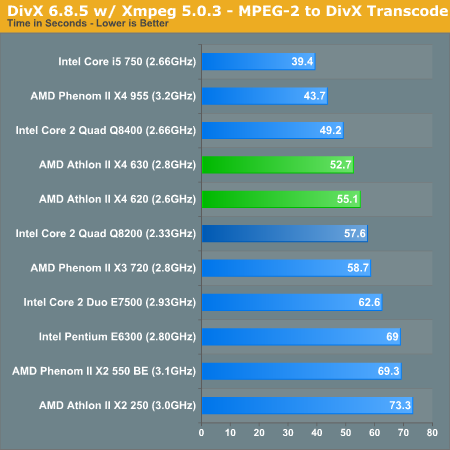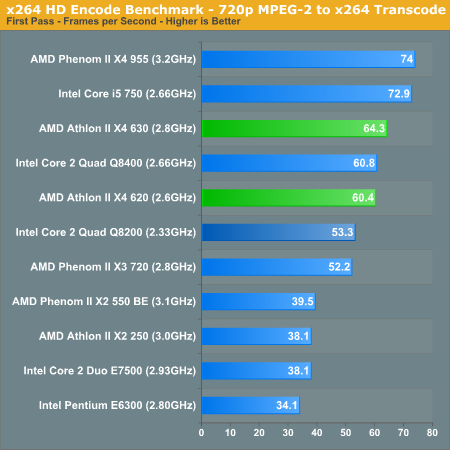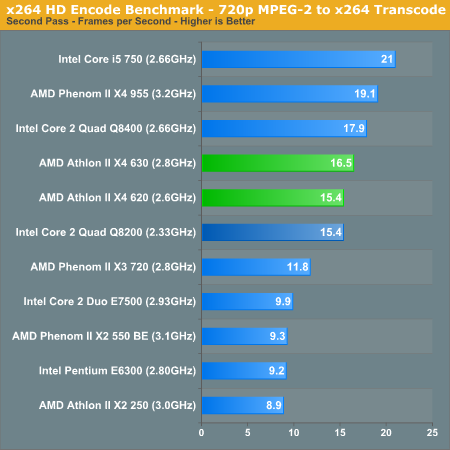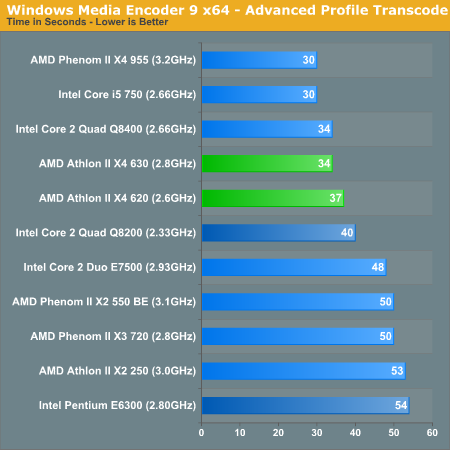AMD Athlon II X4 620 & 630: The First $99 Quad Core CPU
by Anand Lal Shimpi on September 16, 2009 12:00 AM EST- Posted in
- CPUs
DivX 8.5.3 with Xmpeg 5.0.3
Our DivX test is the same DivX / XMpeg 5.03 test we've run for the past few years now, the 1080p source file is encoded using the unconstrained DivX profile, quality/performance is set balanced at 5 and enhanced multithreading is enabled:

Four cores and you're good to go with video encoding. The Athlon II X4s are faster than the Q8200 and even the Phenom II X3 720. Intel doesn't have anything that offers better performance at $99 from a video encoding standpoint.
x264 HD Video Encoding Performance
Graysky's x264 HD test uses the publicly available x264 codec (open source implementation of H.264) to encode a 4Mbps 720p MPEG-2 source. The focus here is on quality rather than speed, thus the benchmark uses a 2-pass encode and reports the average frame rate in each pass.

The Athlon II X4 continues to beat up on more expensive chips. The Q8200 and the E7500 don't stand a chance. Only the Phenom II X4 and Core i5 are faster.

The Core 2 Quad Q8200 is only able to match the Athlon II X4 620 in performance here. While I'm used to writing that AMD needs to adjust prices downward, here the pressure falls on Intel.
Windows Media Encoder 9 x64 Advanced Profile
In order to be codec agnostic we've got a Windows Media Encoder benchmark looking at the same sort of thing we've been doing in the DivX and x264 tests, but using WME instead.

The Athlon II X4s round up our video encoding tests in the lead. At $99 you can't buy a better quad-core processor, or even dual-core for that matter if you're going to be encoding video.










150 Comments
View All Comments
smn198 - Wednesday, September 16, 2009 - link
[quote][It] is unfair to present the results this way, turbo is overclocking[/quote]I think we need to review our definition of overclocking. For years both Intel and AMD, have varied processors' speed and voltage based on temperature and workload. Intel has now changed how they are doing this. Using two cores your processor runs at one speed and using all four, it runs at another. As this is how Intel is selling the CPU I'd argue that this isn't overclocking as by definition, this is running at a frequency beyond spec. Therefore it is a perfectly fair way to present the results.
Eeqmcsq - Wednesday, September 16, 2009 - link
"Therefore it is a perfectly fair way to present the results."- Yes, but it's also an incomplete way of viewing Turbo CPUs, as demonstrated in Gary's follow up benchmarks. Based on his benchmarks, the i5 loses its Turbo advantage if you start heavily multitasking the system. In heavy multitasking, the i5 performance approaches the performance of i5 with Turbo off, which was generally worse than the Phenom II 965, at least based on the benchmarks supplied by Gary. So it's definitely another variable to keep in mind when comparing CPUs.
jonup - Wednesday, September 16, 2009 - link
Well Intel could not clock the i5 at higher stock because it would have outperformed the i7s. People should stop complaining about benches with turbo on. Fact of the matter is i5 outperforms the PII clock for clock and overclocks higher that the PII. the 965BE is clocked 700+MHz higher than the i5 and it consumes a lot more energy. The fact of the matter is that Intel will not clock the i5 at 3.2GHz and disable the turbo mode (because of the i7), but you can do it (safely).Eeqmcsq - Wednesday, September 16, 2009 - link
> People should stop complaining about benches with turbo on.Well, it depends on what the complaint is. For me personally, my complaint has been that the Turbo on numbers alone are not enough to describe the capabilities of a Turbo CPU. I wanted Turbo off numbers too, to get a baseline on what the CPU can do when Turbo can't help.
Thankfully, Gary has done that and it shows that when you throw a lot of tasks at the i5, it falls noticeably behind the 965BE. And that's important to know. If I had to choose between the i5 and 965BE at home, my choice is the i5, because I do so little at home that pushes 4 cores, that the Turbo would be useful and helpful. At work, however, I'm pushing all of my available cores compiling large amounts of source code, while zipping or unzipping files, while my version control client app is busy doing whatever it's doing in the background eating up one of the cores at 100%, while I'm running a simulator app which requires another core. In this case, I MUST choose the 965BE over the i5, because the i5's Turbo can't help me, so it performs closer to Turbo off, making it worse than the 965BE.
So for me, that's why I want Turbo off numbers. I'm after the complete picture.
jonup - Thursday, September 17, 2009 - link
Well as erple2 said make your decision based on the multithreaded benchmarks. Also, even in multithreaded apps the turbo kicks in (marginally), therefore, disabling the turbo is not giving you an accurate picture.Anyways, it seems like in you work environment you will be better off with an i7, because Gary's number do show significant improvement with HT on in multithreaded test. Especially since you use it for work, the ROI will justify the additional $100 expense.
My point however was that if you are given the opportunity (bios access) you will be better off OCing the i5 to 3.2GHz (the single core turbo on value). After all 965BE is an OCed PII; it is obvious from the power consumption numbers. And due to the reasons I mentioned you will not see a factory OCed i5 (3.2GHz stock clock). That does not mean that i5 cannot run 3.2GHz turbo off (safely), and out perform the PII. I would actually speculate that @ 3.2GHZ, i5 will be within the thermal envelop of 965BE.
Eeqmcsq - Thursday, September 17, 2009 - link
> Anyways, it seems like in you work environment you will be better off with an i7You are right and I agree that the i7 with hyperthreading would be the BEST choice for my work loads. Convincing an IT guy that I NEED an i7 when all of our programmers can adequately get work done with our old Pentium D's, uh, that's another matter.
> you will be better off OCing the i5 to 3.2GHz (the single core turbo on value)
Yep, this is also an alternative for me, but it works around the issue on how to compare Turbo CPUs to non Turbo CPUs. Also, see my, uh, "essay" written above.
jonup - Thursday, September 17, 2009 - link
"Convincing an IT guy that I NEED an i7 when all of our programmers can adequately get work done with our old Pentium D's, uh, that's another matter. "Well, in that case you might have an issue convincing them that you need a 965BE. Or a i5 for that matter. :)
Eeqmcsq - Thursday, September 17, 2009 - link
> Well, in that case you might have an issue convincing them that you need a 965BE. Or a i5 for that matter. :)Haha, yeah, I know! I'm stuck with my Pentium D for the foreseeable future. :( Unless our IT guys will bite at a $100 Athlon X4... and a bagel or two. :P
maxxcool - Friday, September 18, 2009 - link
heh, I gutted my workstation after hours and installed a Kuma 7750 onto a 8200 series asus board. i *had* a p4 3.0ht and it was killing me inside when doing log file grep'ing, compression and local database work.the best part was using the companies "reward dollars" to buy the mobo and cpu. :) now.... I magically can do *more* work and am getting more reward bucks.... :D
jonup - Thursday, September 17, 2009 - link
Well maybe if you get the begels u can talk him into it.